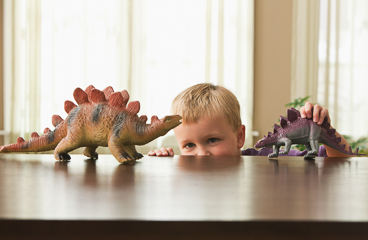
How does a child show grief?
Your child may feel grief when they lose a beloved person, pet, or thing. It is also natural to feel grief when a valued way of life is lost, such as a home, a parent's job, or good health. Your child also may grieve for a loved one who is sick and dying. And children often feel the pain of loss before a big move or a divorce.
The ways children express grief are usually different from the way adults express it. Children are not always able to use words to say what they feel. Instead, they often express their feelings through behavior. Even children who can talk about their feelings may not always be able to express the many, sometimes conflicting, emotions they have.
Children may:
- Become very quiet or very talkative. They may become overactive.
- Have temper tantrums or angry outbursts or have trouble following directions.
- Have trouble getting along with other children.
- Return to earlier behaviors, such as wetting the bed after they have been dry for months or years.
- Cling to adults and want extra time and attention.
- Have difficulty completing school work. Their grades may drop.
Grief is different for each child. There is no "normal" or "expected" period of time for grieving.
Why is it important to help a child grieve?
- Their feelings are real. It is important for adults to acknowledge that each child has unique feelings after a major loss.
- They may not understand why things happen. Children often do not know why losses occur. They may think that they caused the loss or that they are being punished for something they did. Correcting such false ideas may relieve a child's anxiety and fear.
- They need information. After a major loss, each child's concerns differ, depending on the child's age and emotional development. For example, after the loss of a parent, a young child may ask who will take them to school. It is important for adults to listen to a child and answer any questions or concerns.
How can you help a child grieve?
- Be honest about the loss. Not telling children about a major loss may cause them to develop unrealistic fears and concerns. Children may also feel insecure because they know the adults are not being honest. Not telling a child that a loved one has died may prolong the child's grief.
- Provide safety and security. To express their feelings, children need an adult who makes them feel safe and secure.
- Tell other important adults in your child's life about the recent loss. Child care providers, teachers, and school counselors may also be able to help your child work through the grief.
- Keep your child's age and emotional development in mind as you help your child work through grief. Children see loss and death in different ways as they grow and develop.
- Children younger than age 2 cannot express with words what is going on in their lives. Reassure your child by holding and cuddling them.
- Children between ages 2 and 3 are just learning to use words. Talk with your child using some of the same words your child uses. Speak clearly, but be brief when you explain a loss to your child.
- Children between ages 3 and 6 often believe that their thoughts and wishes cause things to happen. Offer reassurance that your child did not cause the "bad" thing to happen.
- Children between ages 6 and 10 do not always fully understand events that occur in their lives. They may invent conclusions or draw the wrong conclusions about things they do not understand. They may develop fears, such as a fear of death.
- Children between ages 10 and 12 are able to understand loss the way adults do. They see death as permanent. They often want to be included in all activities as though they were adults.
- Use activities to create ways for your child to express feelings about the loss. For example, storytelling may help your child express emotions through made-up characters. Let your child tell the story with different endings.
- Read books with your child that help explain concepts of loss and death.
- Have your child draw pictures about feelings.
- Use stuffed animals, toys, and puppets to let your child play-act their emotions.
Where can you learn more?
Go to http://www.healthwise.net/patientEd
Enter Q249 in the search box to learn more about "Learning About How to Help a Child Cope With Grief".
Current as of: November 16, 2023
Author: Healthwise Staff
Clinical Review Board
All Healthwise education is reviewed by a team that includes physicians, nurses, advanced practitioners, registered dieticians, and other healthcare professionals.

